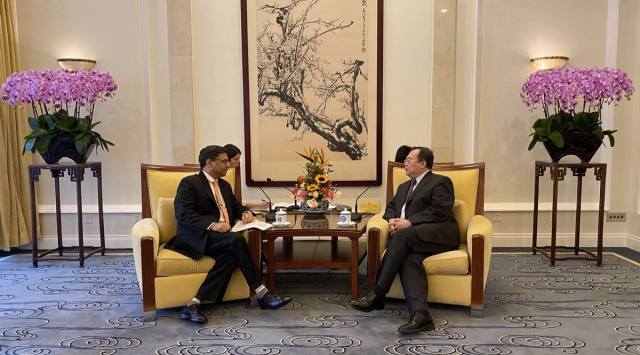In what is being seen as a candid assessment of the challenges in India-China ties, India’s ambassador to Beijing Vikram Misri has listed “avoid shifting goalposts”, “take a one-sided view of concerns and sensitivities”, and “viewing bilateral relations through the prism of relations with other countries” as “obstacles which could block progress” in the relationship.
Misri, who spoke at the IDSA-Sichuan University Virtual Dialogue earlier this week, said, “I remain convinced that we can resolve our current difficulties without the outcome necessarily appearing to be a win or loss for either side.”

This is the most frank analysis of the problem in the bilateral relationship by the Indian envoy, a year-and-half after the border stand-off in Ladakh began. The speech was made on September 23, but was made public by the Indian embassy in Beijing on Saturday.
Following the disengagement in the Galwan Valley in July last year, the two sides were able to disengage from the North and South Banks of the Pangong lake in February 2021, and most recently from Gogra in August 2021.
“The conversation between the two sides continues regarding the remaining locations and we hope that disengagement at the remaining friction areas will enable us to reach a point where we can pick up the threads of bilateral cooperation,” Misri said.
On the challenges facing the relationship, he said, “The first is to avoid shifting goalposts. For long, the Indian and Chinese sides have adhered to a well-understood distinction between resolving the Boundary Question and managing border affairs.”
Underlining the pacts signed since the 1988 understanding between the two countries, Misri said, “…Any attempt to confuse border affairs with the Boundary Question is a disservice to the work of those involved in finding solutions. This is why the Indian side has been consistently saying that the current issue is about restoring peace and tranquillity to the border areas, and is not about the resolution of the larger Boundary Question, on which our stance has not changed, despite what happened last year.”
Story continues below this ad
The second obstacle, the Indian ambassador said, is to “take a one-sided view of concerns and sensitivities, where one’s own preoccupations trump any of those flagged by the other side”.
“Affixing blame exclusively on the other side is not a helpful approach. And to press one’s own concerns and disregard the other side’s concerns and sensitivities without any explanation or recourse goes beyond disrespect. It actually creates even more obstacles to finding solutions,” he said.
Misri said these issues need not be limited to the “realm of high politics”. Far less complex issues, which have a purely humanitarian context and are not connected to bilateral diplomatic positions — such as facilitating the movement of students, businesspersons, and stranded family members from India to China for over a year and a half now, await a more balanced and sensitive approach, he said.
India, he said, has also attempted to keep trade and commercial relationships insulated from current differences, for instance by continuing to issue visas to Chinese businesspersons to visit India.
Story continues below this ad
“However, we are disappointed to see an unscientific approach with regard to several problems currently being faced by Indian students, businessmen, marine crew and exporters, to name a few,” the Indian envoy said.
The third obstacle, Misri said, is “viewing bilateral relations through the prism of relations with other countries”. This was said in the context of the Quad leaders’ summit, and Beijing’s publicly-articulated concerns over it.
The ambassador underlined that India and China are two ancient civilisations and two modern Asian nations that have developed their independent foreign policies, and cherish their strategic autonomy.
He said that India formulates its national and foreign policies on the basis of national interest first and foremost. Many of these forums include China — the SCO, BRICS, and RIC are some examples — and these dialogues have continued even during the difficult phase that the bilateral relationship is passing through.









